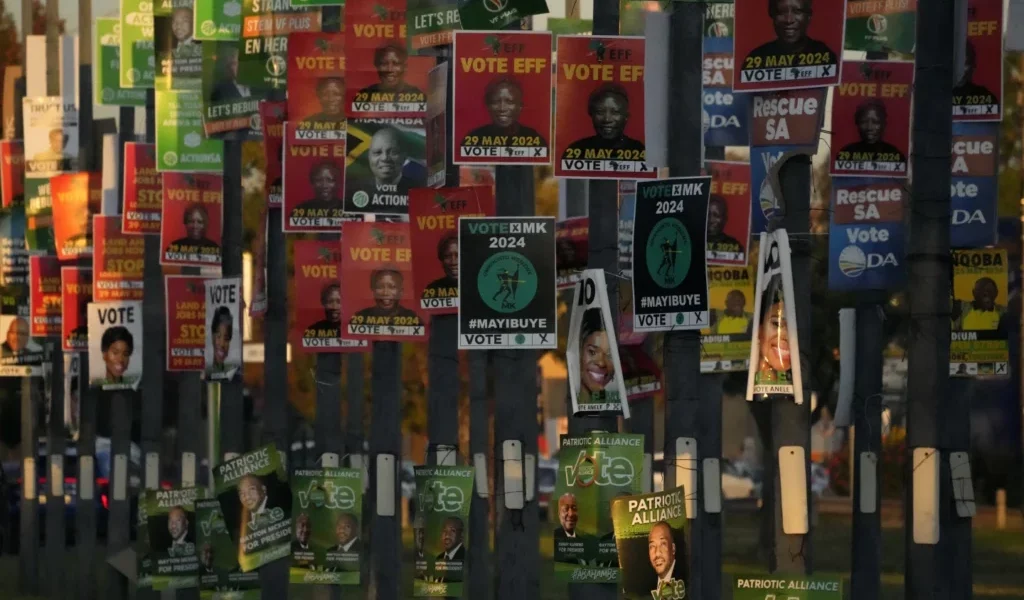
AS South Africans go to the polls on May 29 to vote in national and provincial elections,
the African National Congress (ANC), which has dominated politics for the last three decades and has become almost synonymous with the state, is projected to lose its parliamentary majority for the first time since it won power in 1994, according to various voter surveys.
The party that played a leading role in liberating the country from white minority rule faces a real prospect of having to form a coalition government, even as its leaders insist that it will once again win more than 50 per cent of the vote.
Unemployment, unreliable electricity supply and corruption are South Africans’ top concerns, according to an Afrobarometer pre-election telephone survey.
The most urgent problems that South Africans want their government to address are unemployment, unreliable electricity supply and corruption, the Afrobarometer telephone survey shows.
Citizens also cite economic issues including inflation, poverty and management of the economy.
A majority of South Africans say they are dissatisfied with the way democracy is working in their country, and they overwhelmingly say their country is going in ‘the wrong direction’.
Even among likely voters, one-third say they have not decided which party they will vote for.
These findings are from a telephone survey conducted between April 23 and May 11 with a sample of 1,800 South Africans aged 18 and older selected from a database of more than 14 million mobile phone numbers
The margin of sampling error is +/-2.3 percentage points.
Among the key findings, unemployment far outranks other issues as the country’s most important problem that citizens want their government to address, cited by 71 per cent of respondents as one of their three priorities.
Electricity/load shedding (26 per cent), corruption (21 per cent), inflation/cost of living (21 per cent), poverty (21 per cent) and management of the economy (20 per cent) are the other top priorities that South Africans want government action on.
The Afrobarometer survey also shows that more than six in 10 South Africans (62 per cent) say they are dissatisfied with the way democracy works in their country, while only 36 per cent express satisfaction.
More than eight in 10 South Africans (85 per cent) say the country is going in the wrong direction, up from 46 per cent in 2011.
Among respondents who say they are registered and are likely to vote, about one-third (32 per cent) say they have not decided which party they will vote for.
Afrobarometer is a pan-African, non-partisan survey research network that provides reliable data on African experiences and evaluations of democracy, governance and quality of life. Nine rounds of face-to-face surveys in up to 42 countries have been completed since 1999. Afrobarometer’s national partners conduct face-to-face interviews in the language of the respondent’s choice.
While Afrobarometer is known for its face-to-face surveys, which are conducted on a roughly two-year cycle, the organisation is refining methods for more limited telephone surveys on emerging topics between standard survey rounds.
This is the first publicly released telephone survey by the Afrobarometer team, which was led by the Institute for Justice and Reconciliation (IJR).
Meanwhile, the Women’s Election Mechanism for Peace (WEMP) has expressed concern about what it says are attempts to undermine the credibility of the Independent Electoral Commission (IEC), and in so doing the integrity of the elections.
The WEMP said in a statement this trend was first noticeable in the messages conveyed by political party representatives about the IEC’s readiness to conduct the elections.
It noted that videos were circulating about the IEC’s lack of pens at voting stations and alleged ‘vote rigging’ in eThekwini municipality in KwaZulu-Natal.
The individuals who filmed the video entered the premises without authorisation, the WEMP statement said, adding: ‘They filmed the delivery of ballot papers in preparation for the upcoming elections and then depicted this as if it was ballots already cast.
‘This is a clear attempt to undermine the integrity of the elections.
‘The spread of such misinformation and disinformation must be condemned in the strongest terms as its ultimate goal is to cast a long shadow of doubt on the results of the election. ‘These are the kinds of dubious actions that engender election-related violence and lead to the spiralling of a country into conflict,’ the WEMP statement added.
It called on the law enforcement agencies to ‘immediately investigate this matter and take action against these individuals’.
It urged all South Africans ‘to protect our hard-won democracy by not spreading misinformation and disinformation and by reporting those who do’.
The WEMP statement continued: ‘We call on political parties and independent candidates to adequately explain voting processes to their supporters to avoid any further misinformation.
‘In line with the South African National Action Plan on Women Peace and Security adopted by government in 2020, WEMP is designed to have women engage in conflict prevention (early warning, preventative diplomacy, mediation and election observation) and in so doing contributes towards a peaceful, credible election and to the building of a broader peace infrastructure in South Africa.’













